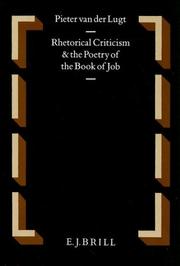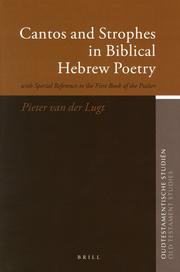| Listing 1 - 10 of 13 | << page >> |
Sort by
|

ISSN: 01697226 ISBN: 9004103260 9004493530 9789004103269 9789004493537 Year: 1995 Volume: 32 Publisher: Leiden Brill
Abstract | Keywords | Export | Availability | Bookmark
 Loading...
Loading...Choose an application
- Reference Manager
- EndNote
- RefWorks (Direct export to RefWorks)
Rhetorical Criticism and the Poetry of the Book of Job deals with the structure and meaning of the poems we find in Job 3-42,6. It is demonstrated that these poems exhibit a consistent pattern of cantos and strophes. The recurring structures often place the various thematic aspects of the texts in a different light. The analysis of the poems relates their rhetorical framework to the device of distant repetitive parallelism. These verbal repetitions appear to display distinct patterns and help to discover recurring and leading ideas. The final section offers a new theory on the demarcation of the (three) speech-cycles which give structure to chs. 4-31 and 38-41. This theory is of special importance for the interpretation of chs. 24-28. The work is of interest for all who study the forms and meaning of classical Hebrew poetry.
Bible--Rhetoric --- Bible--Rhétorique --- Bijbel--Retorica --- Bijbelse retorica --- Retorica in de Bijbel --- Rhetoric in the Bible --- Rhétorique dans la Bible --- Rhetoric in the Bible. --- Bible. --- Criticism, interpretation, etc. --- 223.2 --- Job. Hiob --- Ayyūb (Book of the Old Testament) --- Giobbe (Book of the Old Testament) --- Hiob (Book of the Old Testament) --- Ijob (Book of the Old Testament) --- Iobus (Book of the Old Testament) --- Iov (Book of the Old Testament) --- Iyov (Book of the Old Testament) --- Iyyov (Book of the Old Testament) --- Job (Book of the Old Testament) --- Jobus (Book of the Old Testament) --- Livro de Jó --- Yop-ki (Book of the Old Testament) --- Bible. Job --- Criticism, interpretation, etc --- Ancient rhetoric --- Classical languages --- Greek language --- Greek rhetoric --- Latin language --- Latin rhetoric --- Rhetoric --- Bible. A.T.. Job --- Rhétorique antique --- Bible. A.T. Job --- Style --- Critique, interprétation, etc. --- Rhétorique antique --- Rhétorique dans la Bible --- Critique, interprétation, etc.

ISBN: 9004148396 9047417100 9789004148390 9789047417101 Year: 2006 Volume: 53 Publisher: Leiden Boston : E. J. Brill,
Abstract | Keywords | Export | Availability | Bookmark
 Loading...
Loading...Choose an application
- Reference Manager
- EndNote
- RefWorks (Direct export to RefWorks)
This volume deals with the poetic framework and material content of the book of Psalms. The rhetorical analyses of Psalms 1-41 are preceded by a broad survey of the history of strophic investigation into Hebrew poetry, starting from the beginning of the nineteenth century. Formal and thematic devices demonstrate that the psalms are composed of a consistent pattern of cantos (stanzas) and strophes. The formal devices include quantitative balance on the level of cantos in terms of the number of verselines, verbal repetitions and transition markers. A quantitative structural approach also helps to identify the focal message of the poems. An introduction to the design of biblical poetry, describing the fundamentals that determine the macrostructure of individual compositions, concludes this massive study.
Hebrew poetry, Biblical --- Stanzas. --- Rhetoric in the Bible. --- History and criticism. --- Bible. O.T. Psalms I-XLI --- Criticism, interpretation, etc --- Bible. Psalms --- Language, style --- Hebrew poetry [Biblical ] --- History and criticism --- Rhetoric in the Bible --- Stanzas --- 223.3 --- Strophes --- Psalmen --- Bible. --- Biblos Psalmon (Book of the Old Testament) --- Buch der Preisungen (Book of the Old Testament) --- Liber Psalmorum (Book of the Old Testament) --- Mazāmīr (Book of the Old Testament) --- Preisungen (Book of the Old Testament) --- Psalmen (Book of the Old Testament) --- Psalmoi (Book of the Old Testament) --- Psalms (Book of the Old Testament) --- Psalms of David (Book of the Old Testament) --- Psaumes (Book of the Old Testament) --- Pseaumes de Dauid (Book of the Old Testament) --- Salmenes bok (Book of the Old Testament) --- Salmos (Book of the Old Testament) --- Shihen (Book of the Old Testament) --- Sifr al-Mazāmīr (Book of the Old Testament) --- Soltar (Book of the Old Testament) --- Tehilim (Book of the Old Testament) --- Tehillim (Book of the Old Testament) --- תהלים (Book of the Old Testament) --- Zsoltárkönyv (Book of the Old Testament) --- Criticism, interpretation, etc. --- Language, style. --- Poetics --- Poetry --- Rhyme --- Versification --- Hebrew poetry, Biblical - History and criticism. --- Bible. A.T.. Psaumes --- Poésie hébraïque biblique --- Critique, interprétation, etc. --- Histoire et critique
Book
ISSN: 01697226 ISBN: 9789004260948 9789004262799 9004260943 Year: 2013 Volume: 63 Publisher: Leiden Brill
Abstract | Keywords | Export | Availability | Bookmark
 Loading...
Loading...Choose an application
- Reference Manager
- EndNote
- RefWorks (Direct export to RefWorks)
Hebrew poetry, Biblical --- Stanzas. --- Rhetoric in the Bible. --- 223.3 --- Strophes --- Poetics --- Poetry --- Rhyme --- Versification --- History and criticism. --- Psalmen --- Bible. --- Biblos Psalmon (Book of the Old Testament) --- Buch der Preisungen (Book of the Old Testament) --- Liber Psalmorum (Book of the Old Testament) --- Mazāmīr (Book of the Old Testament) --- Preisungen (Book of the Old Testament) --- Psalmen (Book of the Old Testament) --- Psalmoi (Book of the Old Testament) --- Psalms (Book of the Old Testament) --- Psalms of David (Book of the Old Testament) --- Psaumes (Book of the Old Testament) --- Pseaumes de Dauid (Book of the Old Testament) --- Salmenes bok (Book of the Old Testament) --- Salmos (Book of the Old Testament) --- Shihen (Book of the Old Testament) --- Sifr al-Mazāmīr (Book of the Old Testament) --- Soltar (Book of the Old Testament) --- Tehilim (Book of the Old Testament) --- Tehillim (Book of the Old Testament) --- תהלים (Book of the Old Testament) --- Zsoltárkönyv (Book of the Old Testament) --- Criticism, interpretation, etc. --- Language, style. --- Blessed in the man that walketh not in the counsel of the ungodly (Biblical Psalm) --- Bible --- Language, style --- Bible. O.T. Psalms I-XLI --- Criticism, interpretation, etc --- Bible. Psalms --- Hebrew poetry [Biblical ] --- History and criticism --- Rhetoric in the Bible --- Stanzas --- Hebrew poetry, Biblical - History and criticism.
Book
ISBN: 9789004513976 9789004514768 9004513973 9004514767 Year: 2022 Publisher: Leiden Brill
Abstract | Keywords | Export | Availability | Bookmark
 Loading...
Loading...Choose an application
- Reference Manager
- EndNote
- RefWorks (Direct export to RefWorks)
"In this volume, Pieter van der Lugt offers a comprehensive analysis of the rhetorical structure of Isaiah. As in his previous studies on the Book of Job and the Psalter the author demonstrates that classical Hebrew poetry displays a well-defined structure consisting of balanced main parts (cantos) and subdivision into strophes. This rhetorical starting point is of crucial importance for the delimitation of the individual poems in Isaiah 40-48 and in many cases determines their interpretation. Subsequently, it is demonstrated that the successive compositions form well-defined and coherent cycles of poems"--
Inscriptions, Hebrew --- Jewish seals (Numismatics) --- Seals (Law) --- Seals (Numismatics) --- Hebrew inscriptions --- 224.2 --- 224.2 Isaie --- 224.2 Jesaja. Isaias --- Isaie --- Jesaja. Isaias --- Bible --- Bible. --- Book of Isaiah (Book of the Old Testament) --- Ēsaias (Book of the Old Testament) --- Esaïe (Book of the Old Testament) --- Isaia (Book of the Old Testament) --- Isaiah (Book of the Old Testament) --- Isaias (Book of the Old Testament) --- Isaïe (Book of the Old Testament) --- Izaya sho --- Jesaja (Book of the Old Testament) --- Jesajabuch (Book of the Old Testament) --- Sefer Y'sha'yah (Book of the Old Testament) --- Yeshaʻyahu (Book of the Old Testament) --- Y'sha'yah (Book of the Old Testament) --- Socio-rhetorical criticism
Book
ISBN: 0798120681 9780798120685 Year: 1987 Publisher: Kaapstad : Human & Rousseau,
Abstract | Keywords | Export | Availability | Bookmark
 Loading...
Loading...Choose an application
- Reference Manager
- EndNote
- RefWorks (Direct export to RefWorks)
Book
ISBN: 0798118261 Year: 1984 Publisher: Kaapstad : Human & Rousseau,
Abstract | Keywords | Export | Availability | Bookmark
 Loading...
Loading...Choose an application
- Reference Manager
- EndNote
- RefWorks (Direct export to RefWorks)
Book
ISBN: 0798118997 9780798118996 Year: 1985 Publisher: Kaapstad : Human & Rousseau,
Abstract | Keywords | Export | Availability | Bookmark
 Loading...
Loading...Choose an application
- Reference Manager
- EndNote
- RefWorks (Direct export to RefWorks)
Afrikaans poetry. --- Afrikaans poetry. --- Afrikaans. --- Gedichten. --- Poésie afrikaans.
Book
ISBN: 0798125535 Year: 1989 Publisher: Kaapstad : Human & Rousseau,
Abstract | Keywords | Export | Availability | Bookmark
 Loading...
Loading...Choose an application
- Reference Manager
- EndNote
- RefWorks (Direct export to RefWorks)
Book
Year: 1980 Publisher: Kampen Kok
Abstract | Keywords | Export | Availability | Bookmark
 Loading...
Loading...Choose an application
- Reference Manager
- EndNote
- RefWorks (Direct export to RefWorks)
Book
ISBN: 9004262792 Year: 2014 Publisher: Brill
Abstract | Keywords | Export | Availability | Bookmark
 Loading...
Loading...Choose an application
- Reference Manager
- EndNote
- RefWorks (Direct export to RefWorks)
This volume deals with the rhetoric, the formal and thematic framework, of Psalms 90-150 (the Fourth and Fifth Book of the Psalter). It is the conclusion of the Psalms Project started with Psalms 1-41, OTS 53 (2006) , and continued with Psalms 42-89, OTS 57 (2010). Formal and thematic devices demonstrate that the psalms are composed of a consistent pattern of cantos (stanzas) and strophes. The formal devices especially include quantitative balance on the level of the cantos in terms of verselines, verbal repetitions, and (on the level of the strophes) transition markers. The quantitative approach to a psalm in terms of verselines, cola and/or words in most cases clearly discloses a focal message. This massive study is rounded off by an updated introduction to the canto design of biblical poetry (including the book of Job, Lamentations, the Songs of Songs, Deutero-Isaiah and other major poems of the Hebrew Bible).
Stanzas. --- Rhetoric in the Bible. --- Hebrew poetry, Biblical --- History and criticism. --- Bible. --- Criticism, interpretation, etc. --- Language, style.
| Listing 1 - 10 of 13 | << page >> |
Sort by
|

 Search
Search Feedback
Feedback About UniCat
About UniCat  Help
Help News
News